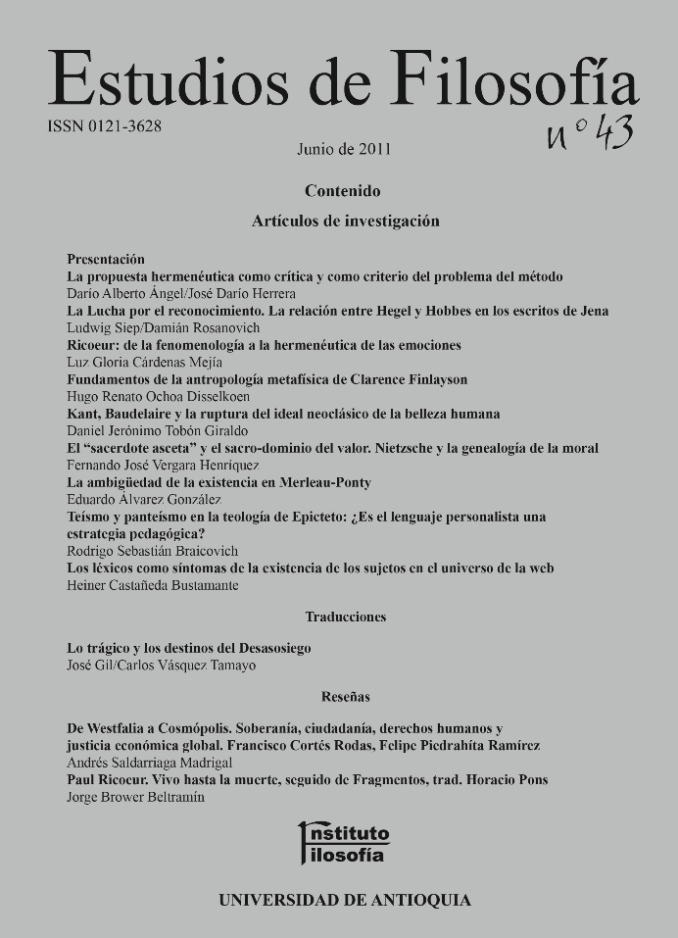Ricoeur: from the phenomenology to the hermeneutics of the emotions
DOI:
https://doi.org/10.17533/udea.ef.11569Keywords:
passions, emotions, rhetoric, phenomenology, hermeneuticsAbstract
This paper belongs to a research project on how Human Experience of Place has as starting point Aristotle’s observation of a fact: Passions present themselves together with judgment on a concrete and determined action. My intention is to collect the studies on Passions, Emotions and Feelings that are to be found in Ricoeur’s early production. I consider Ricoeur, firstly, because the question of the Human Establishment of Place, can be said, belongs to the domain of Phenomenology and Hermeneutics. Secondly, because the author makes use of the above terms and proposes to distinguish them, and this wil allow us to set up a framework for their uses.
Downloads
References
ARISTÓTELES. (1988) Acerca del alma, Trad. de Tomás Calvo Martínez, Madrid, Gredos.
ARISTÓTELES. (1994) Categorías. En: Aristóteles, Tratados de lógica (Órganon), Trad. de Miguel Candel Sanmartín, Madrid, Gredos, pp. 29-77.
ARISTÓTELES. (1987) Metafísica, Trad. de Valentín García Yebra, Madrid, Gredos.
ARISTÓTELES. (1994) Retórica, Trad. de Quintín Racionero, Madrid, Gredos.
CÁRDENAS MEJÍA, L. G. (en prensa) Aristóteles: retórica, pasiones y persuasión, Bogotá, San Pablo.
CÁRDENAS MEJÍA, L. G. (2008) El lugar: Aristóteles-Heidegger. Revista de Filosofía de la Universidad de Costa Rica, pp. 145-150.
HEIDEGGER, M. (1951) El ser y el tiempo, México, Fondo de Cultura Económica.
MERLEAU-PONTY, M. (1957) La estructura del comportamiento, Buenos Aires, Librería Hachette S.A.
PERELMAN, C. y Olbrechts-Tyteca, L. (1989) Tratado de la argumentación o nueva retórica, Madrid, Gredos.
RICOEUR, P. (1991). “Retórica-poética-hermenéutica”. Estudios de Filosofía, 87-97. DOI: https://doi.org/10.17533/udea.ef.339702
RICOEUR, P. (noviembre-diciembre 1998) “Architecture et narrativité”, Urbanisme, pp. 44-51.
RICOEUR, P. (novembre 2002) “Aristote de la colère a l’amitié politique”, Esprit, pp. 19-31.
RICOEUR, P. (2000). La mémoire, l`histoire, l’oublie, Paris, Éditions du Seuil.
RICOEUR, P. (2003) La memoria, la historia, el olvido, Madrid, Trotta.
RICOEUR, P. (2004). Finitud y culpabilidad, Madrid, Trotta.
RICOEUR, P. (1980) La metáfora viva, Madrid, Ediciones Cristiandad.
RICOEUR, P. (1986) Lo voluntario e involuntario I, El proyecto y la motivación, Buenos Aires, Docencia.
RICOEUR, P. (1988) Lo voluntario y lo involuntario II, Poder, necesidad y consentimiento, Buenos Aires, Editorial Docencia.
RICOEUR, P. (1950) Philosophie de la volonté 1 Le volontaire et l’involontaire, Paris, Aubier.
RICOEUR, P. (2009) Philosophie de la volonté 2 Finitude et culpabilité, Paris, Éditions Points.
RICOEUR, P. (1995) Tiempo y narración. Configuración del tiempo en el relato histórico, México, Siglo XXI.
RICOEUR, P. (1993) A l’école de la phénoménologie, Paris, Libraire Philosophique J. Vrin.
TOULMIN, S. (2007) Los usos de la argumentación, Barcelona, Ediciones Península.
VARGAS GUILLÉN, G. y Cárdenas Mejía, L. G. (2005) Retórica, poética y formación, Bogotá, Fondo Editorial Universidad Pedagógica Nacional.
Downloads
Published
How to Cite
Issue
Section
Categories
License
Copyright (c) 2011 Luz Gloria Cárdenas Mejía

This work is licensed under a Creative Commons Attribution-NonCommercial-ShareAlike 4.0 International License.
Authors who publish with this journal agree to the following terms:
1. The Author retains copyright in the Work, where the term "Work" shall include all digital objects that may result in subsequent electronic publication or distribution.
2. Upon acceptance of the Work, the author shall grant to the Publisher the right of first publication of the Work.
3. The Author shall grant to the Publisher a nonexclusive perpetual right and license to publish, archive, and make accessible the Work in whole or in part in all forms of media now or hereafter known under a Creative Commons Attribution-NoCommercia-ShareAlike (CC BY-NC-SA 4.0), or its equivalent, which, for the avoidance of doubt, allows others to copy, distribute, and transmit the Work under the following conditions: (a) Attribution: Other users must attribute the Work in the manner specified by the author as indicated on the journal Web site;(b) Noncommercial: Other users (including Publisher) may not use this Work for commercial purposes;
4. The Author is able to enter into separate, additional contractual arrangements for the nonexclusive distribution of the journal's published version of the Work (e.g., post it to an institutional repository or publish it in a book), as long as there is provided in the document an acknowledgement of its initial publication in this journal;
5. Authors are permitted, and Estudios de Filosofía promotes, to post online the preprint manuscript of the Work in institutional repositories or on their Websites prior to and during the submission process, as it can lead to productive exchanges, as well as earlier and greater citation of published work (see The Effect of Open Access). Any such posting made before acceptance and publication of the Work is expected be updated upon publication to include a reference to the Estudios de Filosofía's assigned URL to the Article and its final published version in Estudios de Filosofía.















